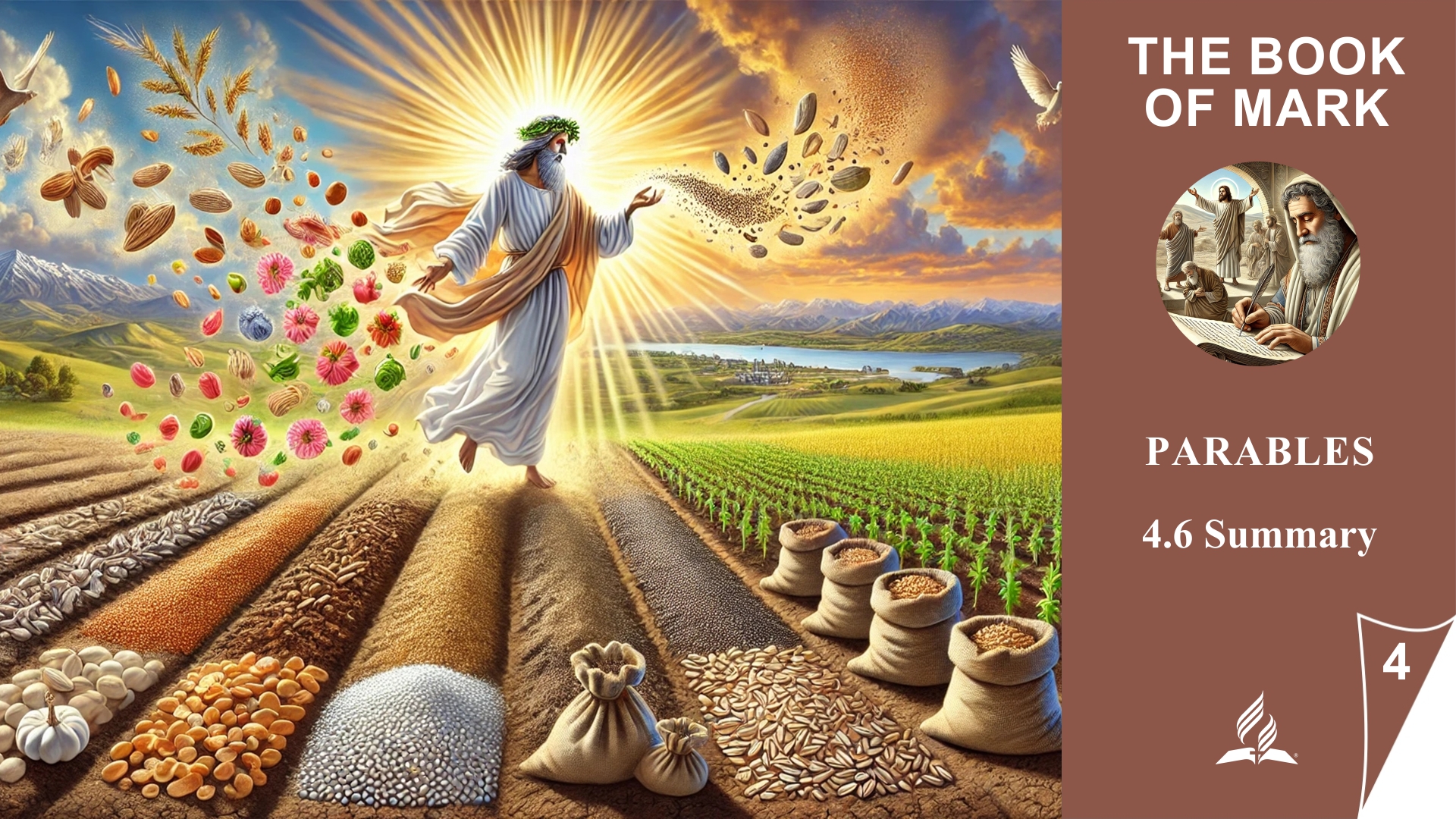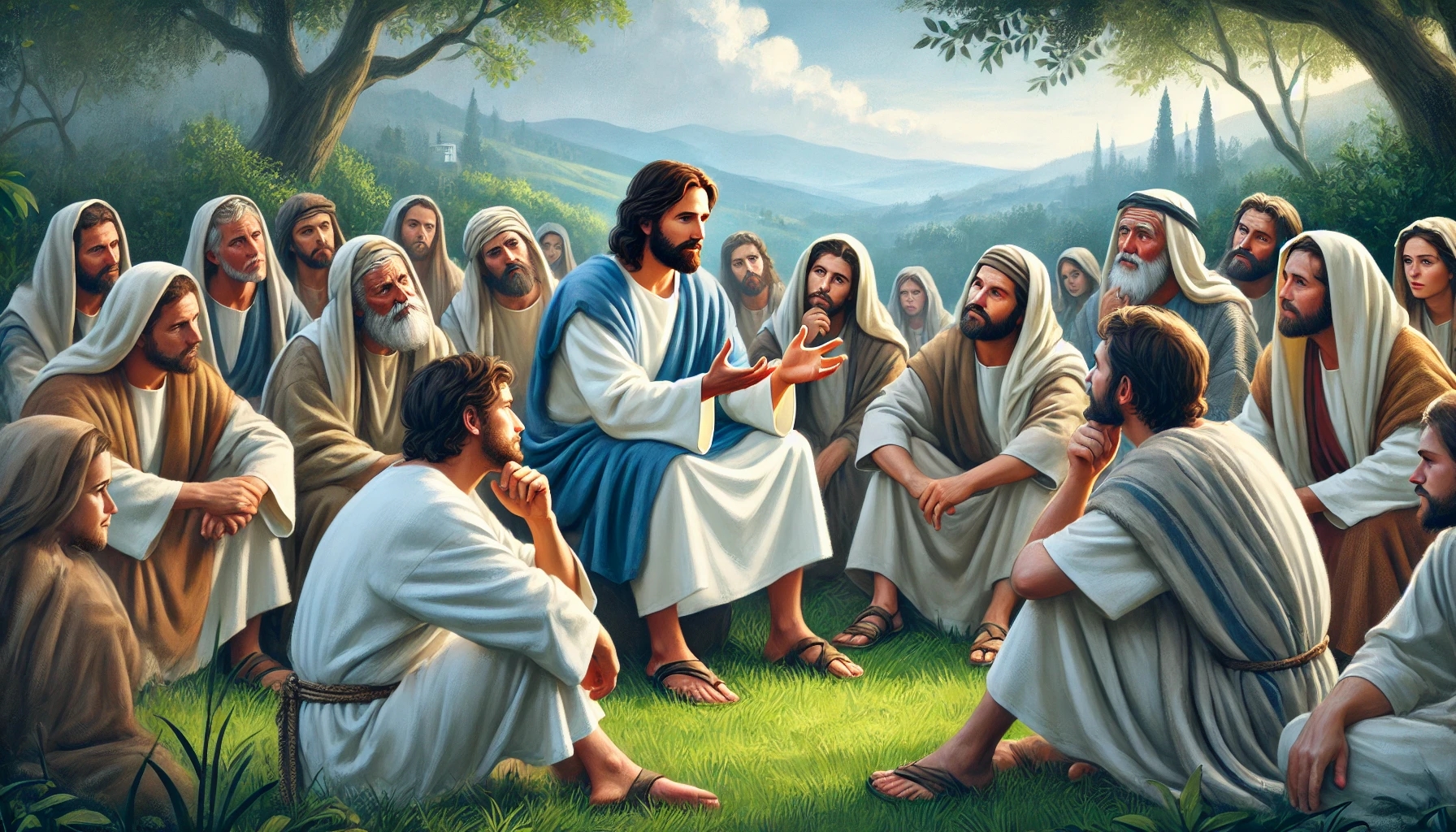


4.6 Summary
Revelation and Growth of the Kingdom of God
4.1 The Parable of the Sower (Mark 4:1–9)
Main Points:
-
Different Soils: Jesus describes four types of soil on which the seed falls: the path, rocky soil, thorny soil, and good soil.
-
Symbolism: The soils represent different responses to the word of God.
-
Path: Those who hear the word of God, but Satan immediately takes it away.
-
Rocky Soil: Those who receive the word with joy but do not develop deep faith and fall away in difficult times.
-
Thorny Soil: Those who hear the word, but life’s worries and riches choke it.
-
Good Soil: Those who hear and accept the word, resulting in fruitfulness.
-
Teaching: The receptiveness of the heart determines the fruitfulness of God’s word.
4.2 Jesus’ Interpretation (Mark 4:13–20)
Main Points:
-
Explanation of the Soils: Jesus explains the meaning of the parable to his disciples.
-
Spiritual Lessons: Understanding and accepting God’s word depend on one’s inner readiness and depth of faith.
Teaching: Spiritual maturity and growth are the results of an open and receptive heart.
4.3 The Purpose of the Parables (Mark 4:10–12)
Main Points:
-
Intent of the Parables: Jesus uses parables to convey spiritual truths while testing the listeners’ hearts.
-
Spiritual Blindness: Many people remain spiritually blind and deaf despite hearing the truth due to their prejudices and hardness of heart.
Teaching: Parables reveal the truth to those who are willing to hear and understand, while they remain hidden from those with closed hearts.
4.4 Lamp and Measure (Mark 4:21–25)
Main Points:
-
Parable of the Lamp: A lamp is not placed under a bowl or bed but on a stand to provide light.
-
Parable of the Measure: With the measure you use, it will be measured to you. Whoever has will be given more; whoever does not have, even what they have will be taken away.
Teaching: We should not hide the light of truth but let it shine. Generosity and openness in giving and receiving lead to abundant blessings.
4.5 Parables of the Growing Seed and Mustard Seed (Mark 4:26–32)
Main Points:
-
Parable of the Growing Seed: The Kingdom of God grows mysteriously through God’s hand, often hidden and without human intervention.
-
Parable of the Mustard Seed: A tiny mustard seed grows into a large plant, symbolizing the astonishing transformation and growth of the Kingdom of God.
Teaching: The Kingdom of God starts small but grows into something great and mighty through God’s work. Our faith and contributions, no matter how small they seem, have the potential to achieve great things.
Conclusion
The parables of Jesus teach us important spiritual truths about the receptiveness of the heart, the hidden yet powerful workings of God’s kingdom, and the importance of generosity and openness. They challenge us to examine our hearts, spread the gospel, and trust in God’s wonderful workings.

Connection to Our Daily Life and Faith
-
Learning in Stages:
-
Daily Life: We often learn in stages, similar to the listeners of Jesus. New concepts and ideas are introduced and deepened gradually to achieve comprehensive understanding.
-
Patience and Perseverance: Patience is necessary to understand complex topics. It requires perseverance and continuous effort to deepen knowledge and skills.
-
Faith:
-
Spiritual Growth: Our spiritual life also progresses in stages. We grow in faith by continuously learning and engaging deeper with Jesus’ teachings.
-
Openness to Teaching: Like the disciples, we must be open and ready to learn from Jesus. Gradual revelation of spiritual truths helps us better understand and integrate them into our lives.
-
Importance of Community:
-
Daily Life: Community and interaction with others enhance learning. Discussions and joint studies deepen our understanding and provide new perspectives.
-
Support and Encouragement: In a community, we receive support and encouragement that helps us overcome challenges and continue growing.
-
Faith:
-
Church Life: In faith, the community of believers is very important. In the church, we can learn, grow, and encourage each other.
-
Discipleship: As Jesus taught his disciples, we are called to practice discipleship. This means helping others grow in faith while learning ourselves.
-
Application of Jesus’ Teachings:
-
Daily Life: Knowledge and teachings are valuable only when we put them into practice. Daily life offers numerous opportunities to apply what we have learned and deepen our understanding.
-
Reflection and Adaptation: Regular reflection helps us review our actions and decisions and improve ourselves.
-
Faith:
-
Living by the Word: Jesus’ teachings are meant to transform our lives. By living according to His word, we become witnesses of His love and truth.
-
Growth through Application: Our faith grows when we apply Jesus’ teachings in our daily lives. This is evident in our actions, decisions, and interactions with others.
-
The Role of the Holy Spirit:
-
Daily Life: In everyday learning and growth, we can understand inner convictions and intuition as guidance that helps us make the right decisions.
-
Faith:
-
Spiritual Guidance: The Holy Spirit plays a crucial role in our spiritual growth. He teaches, reminds, and leads us into the truth.
-
Fulfillment and Power: Through the Holy Spirit, we receive the power and wisdom to understand Jesus’ teachings and implement them in our lives.
Conclusion
Jesus’ method of teaching through parables highlights the importance of gradual learning, community, and practical application of spiritual truths. In our daily life and faith, we can adopt these principles to continuously grow and deepen our understanding. Openness, patience, and the willingness to apply what we learn are essential to realizing Jesus’ teachings in our lives.
Just as Jesus taught His disciples gradually, our understanding of faith grows step by step. Remain open and patient, and trust that God will deepen your understanding and life through His Spirit.
(Visited 14 times, 1 visits today)





















